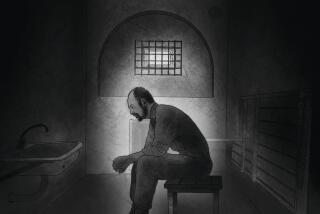Soviet Justice: Aspiring Emigre Gets Gulag Again
- Share via
MOSCOW — In the contest between the power of the Soviet state and Serafim Yevsukov, the outcome was never in doubt.
The denouement came Tuesday in a drab people’s court in Domodedevo, a small town south of Moscow where the Yevsukov family lives.
First, the parents of Serafim, known as Sima, appeared with their daughter, Ludmilla.
Next, a group of about 30 people unknown to the Yevsukovs arrived and went into the judge’s private office to await their duty as spectators.
The lanky 24-year-old defendant, who stands well over six feet tall, was wrestled from a police van into the courthouse as he shouted to his family.
“It’s not a trial--it’s a repression,” he said in rapid-fire Russian. “They’re doing this because we want to leave the country. And because it’s a repression, I am not going to take part.”
Yevsukov was shoved inside a locked courtroom. His father, a quiet man with a firm tone of voice, demanded that the trial be open to the public.
“The public is already here,” said a court official, referring to the ready-made audience assembled in advance.
His mother, a slim, dark-haired woman, pressed an ear to the locked door to try to overhear the legal proceedings inside.
It was not the first time the family had gone through the turmoil of such a trial.
At the age of 20, Sima Yevsukov already was a veteran of the gulag, the system of labor camps in the Soviet Union.
Now, four years later, he faced another three years in the camps for a rare second conviction on the same offense--refusing to serve in the armed forces. From the Soviet point of view, his continued defiance of the law requiring military service by all Soviet males from the age of 18 to 27 is a serious crime.
But the Yevsukovs, an ethnic Russian family, claim that their dream of emigrating would be shattered if Sima learned military secrets and was then barred for that reason from leaving the country.
The son contends he should not have to serve in the army, since he was only 16 years old, below draft age, when he and his family first asked for permission to go abroad.
For eight years, however, the answer on their emigration request has been nyet .
“Nobody wants you,” the Soviet officials told them, underscoring the Yevsukov family’s failure to obtain the required invitation from a family abroad.
At the courthouse, the daughter, Ludmilla, heard the verdict through a crack in the door: The judge had sentenced her brother to another three years in a labor camp.
His mother stiffened, on the brink of tears. her father stared at the ground. Ludmilla, flushed, angrily tore a cigarette in half.
Their show of solidarity with Sima--replicas of a camp prisoner’s badge with Sima’s name on it--proved to be prophetic.
More to Read
Sign up for Essential California
The most important California stories and recommendations in your inbox every morning.
You may occasionally receive promotional content from the Los Angeles Times.













